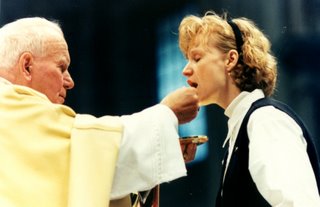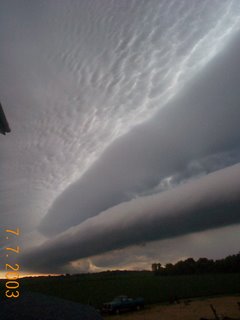You guys are making this too easy for me.
As Honora and forget-me-not and Gabrielle lead us right from surrender into the confessional, this idiot has only to post another excerpt from
His Suffering and Ours to seem like I'm paying attention. Talk amongst yourselves ;-)
God’s judgment is always mercy;
on the Sacrament of Reconciliation
We are made for something more than we pretend to be. But deep down, we know. We can’t not know. There are moments when we see with stinging recognition the disparity between what we could be and what we ARE, and in these moments we know that this is an invitation to become what we are created to be. But we are so far from that goal. Now we have to choose which response we will make our own. We can waste our time agonizing over the life we have tried to live, filled with fear and confusion and resentment, but God has a better idea: Confession.
For some, who have really closed the door of their hearts to Him, this means reconciliation, others focus on the penance, but really, it is about our own confessio. It is about admitting our failings out loud so that we become serious about DOING something about them. It is about hearing our own failings from our own mouths, taking personal responsibility, learning from our mistakes, receiving the grace to become what we are created to be. But first, we must admit to ourselves what we are.
Self-knowledge is a necessary thing; knowing what we are and understanding our own character and what made us what we are, goes a long way toward cleaning our mirror to reflect Him. To know where we have gone wrong, we need to have a good picture of what we should be, so we need to examine ourselves. But here it gets tricky – if there’s one thing the devil knows, it’s our psychology (sometimes I think he was the original psychotic – the first creature to become totally detached from reality - but that’s another story) and he can turn this quest for self-knowledge around on itself, and the infinite hunger of the spirit can get mixed up with the unappeasable human need for understanding.
There is, on the one hand, a self-absorbed, endless cycle of questioning, carrying the past around like an albatross, running ourselves in circles trying to determine past motives, endless guilt over our culpability and the ramifications of our stupidity.
On the other hand, there is a real self-examination, in which we think about our lives in His light, see ourselves through His eyes, with the awareness that His love and mercy never fail. Never. This examination is really a kind of profound prayer that can tear away all the shadows and bring us to a new consciousness. It is a kind of “beknowing,” if we allow it to be; a knowing of our knowing (and unknowing), much like Mary’s own “pondering in the heart.” When we are awakened to this beknowing, we find our place in the universe and begin to view things from that place and everything looks a little different. Things are in proper perspective.
We begin to see that all creation gives God glory just by being, that all things praise Him in seed, in flower, and oftentimes in fruit. But in all of creation, we are the only creatures that can refuse our flowering. All things give Him glory simply by being what they are, without any choice in the timing or manner of their glorifying. They simply are.
But we, having the opportunity to love truly because we have the gift of free will, we think we can negotiate. We think we can know ourselves outside of God, become ourselves without His love, make our own way in the world. We think our destiny is self-made, that we can make ourselves happy. We ignore the fact that He is our only joy, that He loves us already. We make our own mess. Pelagius lives.
This leads to every variety of anxiety and regret and striving for all the wrong stuff. Yet the Church is there, consistently offering forgiveness (which we block by our refusal to admit our faults) and true self-knowledge (which we are too proud to accept) and real freedom – complete freedom from all the questions and doubts, freedom to leave the past to the past and continue toward Home, confident in God’s mercy and love.
It’s too easy. The hard work of reconciliation (and it was VERY hard work) has already been done. God is the “Father of mercies.” He sent His Son to reconcile the world to Himself, because we couldn’t do it. And now He sends the Holy Spirit among us for the forgiveness of sins.
We only need to accept that forgiveness and do our small part. He loves us first. He calls us first. He wants to make us deliriously happy. We only need to accept His offer and cooperate with the grace His love keeps pouring out on us.
We must speak the truth about ourselves to the priest, and the rest is up to God. He will change us. As one theologian said, Simon bar Jonah could have examined himself for the rest of his life, and never discovered Peter in there. It was Christ who revealed his true self to him, once he had admitted his own frailty, and openly called himself “a sinful man.”
He learned what we must all learn: that God is mercy, that His judgment, freely submitted to, is always mercy. That God makes all things new, reveals to us the truth about ourselves, and that it is always better than we think it is. But of course, we must turn to God – Peter was looking at Christ, reaching toward Him, not looking inside himself. And if we look to Christ, reach toward Him instead of looking inside ourselves to discover the truth, He will reveal our true selves to us as well. And we will probably be surprised to find that it is so much better than we think. He makes all things new. He transforms us.
It seems too easy. There must be more to it. But no.
We profess to believe in the forgiveness of sins, but accepting that forgiveness is not always easy.
In case there is any doubt (and until we truly know, experientially, that GOD IS LOVE, we may still doubt), the Church requires the priest to give us absolution in a kind of “solemn declaration” that is very clear:
“God, the Father of mercies,
through the death and the resurrection of his Son
has reconciled the world to himself
and sent the Holy Spirit among us for the forgiveness of sins;
through the ministry of the Church,
may God grant you pardon and peace.
I absolve you from your sins
in the name of the Father,
and of the Son,
and of the Holy Spirit. Amen.”
It is a moment of personal liberation – to sign ourselves with the means of our redemption, to receive through the priest the awesome gift of absolution and mercy, to feel free and grateful and strengthened, to discover anew that we are creatures born for radiance…
Our pristine state is to be light, free, ready for whatever God asks of us. Free enough, like Mary, to bear the words of an angel, free enough to say “fiat” to whatever he asks of us in God’s name. Free enough to see His will in every circumstance and embrace it fully for love of Him.
Yes, free to love fully.





